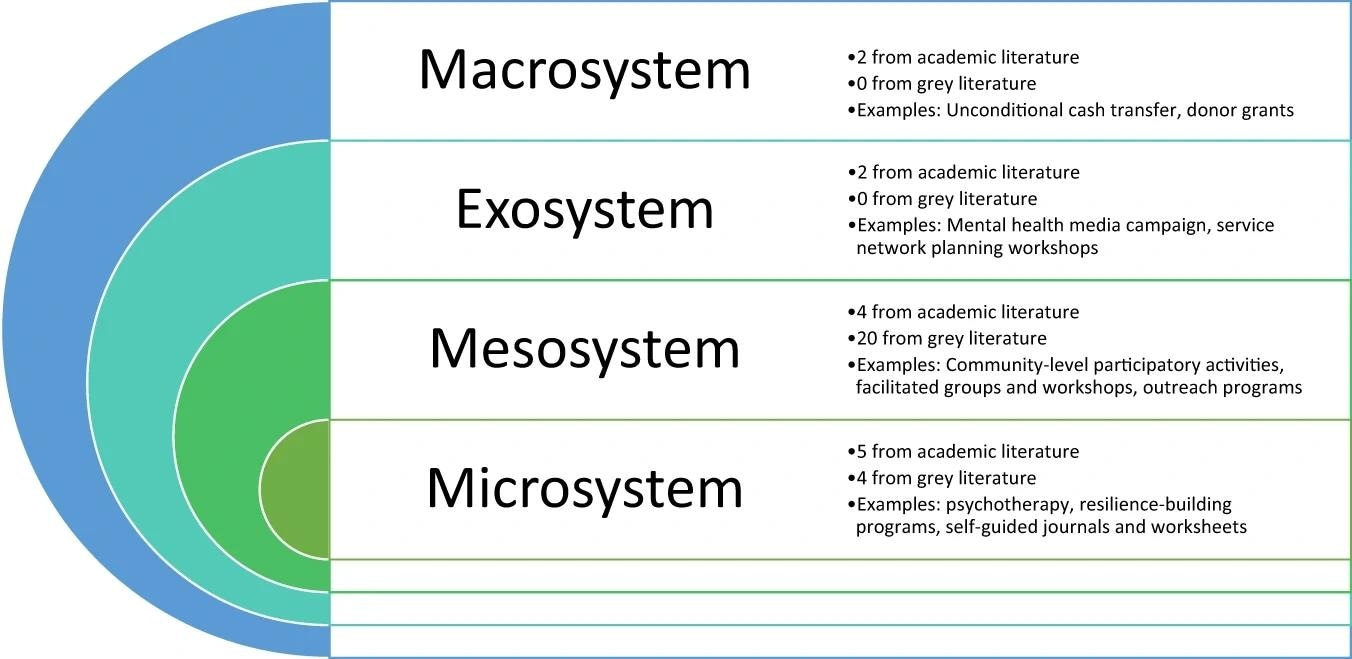The present review highlights the novelty of this field of research, with a majority of included interventions not (yet) being formally evaluated within a robust scientific framework. Nonetheless, preliminary intervention results are promising, especially when applied to low- and middle-income countries disproportionally affected by climate change. Despite extensive scaled-up clinical trials being required before some of these interventions become public health recommendations, this review summarizes scientists' progress in the field and the basis for further research against mental health disability.
 Study: Mental health and psychosocial interventions in the context of climate change: a scoping review. Image Credit: Lightspring / Shutterstock
Study: Mental health and psychosocial interventions in the context of climate change: a scoping review. Image Credit: Lightspring / Shutterstock
Climate change and mental health
Climate change refers to observable long-term shifts in local or (more often) global temperature, rainfall, and weather patterns. Historically, these shifts have occurred gradually, usually as a consequence of natural processes. However, since the advent of the Industrial Revolution, human activity (particularly the combustion of fossil fuels and agricultural activities) has produced unprecedented levels of greenhouse gas emissions, substantially accelerating global warming.
Ever since the description of global warming and climate change in the 1970s, scientists and clinicians have established robust associations between climate change and adverse population-level health outcomes. Starvation and heightened disease risk are at an all-time high, with chronic, age-associated conditions like cancers and cardiovascular diseases (CVDs) rapidly rising in prevalence and intensity. Although novel, studies investigating the associations between climate change and mental health are increasingly becoming popular, especially following recent pandemic-related social distancing regulations and their impacts on psychological well-being.
"Researchers in the climate change and mental health space acknowledge the intricate tension between recognizing the detrimental mental health impacts of climate change while not pathologizing culture-specific, expected, and adaptive responses to ongoing and anticipated threats."
Recent studies have established the detrimental impacts of climate change on the mental well-being of individuals, with substantial environment-associated impacts observed on patients' psychiatric mortality outcomes (post-traumatic stress disorder [PTSD], depression, and increased suicide risk). While some of these studies have recommended and even tested interventions against these adverse outcomes, a significant gap exists in intervention adoption and subsequent evidence-based outcomes analyses. Even reviews attempting to make sense of these outcomes suffer from the shared shortcoming of suboptimal scale–included studies either focus on fine-scale outcomes of just one of two climatic and mental evaluation metrics or broaden their perspective too wide, thereby incorporating and generalizing non-climatic events and stressors.
About the study
The current review has three main aims – 1. Review and evaluate existing interventions aimed at improving mental health or mitigating climatic impacts on mental health; 2. Evaluating broad mental health and well-being outcomes, not restricted by conventional psychiatric definitions; and 3. Applying the first two aims to 'grey literature' – unpublished and not formally defined evidence that served an exploratory role for informing future research. The review methodology was designed in accordance with the JBI Manual for Evidence Synthesis and was prospectively registered with the OSF database on 9 March 2022.
Study data collection commenced with screening available literature using a custom search strategy applied to three online scientific repositories, namely MEDLINE, Web of Science, and PsycINFO, from database inception till 2 May 2022. The citations of publications thus identified were further manually hand-searched to reveal relevant information not found in the public databases. The grey literature equivalent was conducted through a cascade of four steps – 1. targeted database search; 2. Google search; 3. targeted website search; and 4. key stakeholder consultation, following the methodology and best-practice guidelines of Godin et al. and Pollock et al.
Data extraction was carried out by two independent reviewers using the Rayyan.ai platform. The extraction process focused on publication and sample records (authors, publication year, study design, participant sociodemographics, and medical histories) and mental health outcomes. However, other relevant details, including theoretical framework, intervention parameters (duration, cost, delivery methods), facilitator characteristics, and involvement of stakeholders in co-designing the intervention, were also recorded.
Bronfenbrenner's ecological theory was used for review data presentation and discussion. The theory describes an individual's ecological environment across four spatial levels – micro-, meso-, exo-, and macrosystem.

Identified interventions and their level of action based on Bronfenbrenner’s ecological theory as applied to public mental health research.
Study findings and take-home message
Of the 6,248 records initially revealed through the database search, 1,122 were found to be duplicates and removed from the analyses. Of the remaining 5,126 unique publications, title and abstract screening excluded 4,932, and full-text screening excluded an additional 178, resulting in a final publication set of 16 studies representing 13 non-overlapping interventions. Grey literature screening revealed a further 24 interventions.
The stressor reviewed included general climatic changes, stochastic weather events (wildfires, droughts, floods), and phenomena (e.g., cyclones, typhoons). Notably, despite more than 20 years of research in the field, half of the publications included in this review were produced in the last three years alone, highlighting the surge in academic interest against climate change's adverse impacts.
Only 56% (n = 9) of included academic studies involved clinical trial-like settings with quantitative estimations of outcome metrics, highlighting the substantial dearth of empirical evidence with which to implement informed policy interventions. Encouragingly, despite being limited in outreach and validation, this preliminary evidence is positive, depicting substantial improvements in the mental health and psychosocial functioning of individuals enrolled in these programs. Outcomes were observed to be most profound in low- and middle-income countries (LMICs) across Asia, Europe, Sub-Saharan Africa, Oceania, and the Caribbean.
Some of these programs with unexpectedly positive mental health outcomes identified themselves as community-wide resilience-building programs, notable examples of which included the Katatagan program in the Phillippines and the Skills for Life Adjustment and Resilience (SOLAR) program in Tuvalu. While differing in their targets and methodologies, these programs display robust scientific soundness and present community-wide improvements, potentially serving as pilot studies of future, scaled-up interventions.
While almost every single grey area study presented its own unique intervention, the scientific soundness of most of these could not be verified, especially since all of them were conducted by private firms with limited data publicly available.
"Overall, it appears that conceptual linkage for interventions at the intersection of climate change and mental health remains at a nascent stage, and most interventions are newly designed with scarce or anecdotal evidence. Future interventions are recommended to consider at conception the definition of well-being, the interests of underserved groups, co-design, equitable access, and sustainability."
Journal reference:
- Xue, S., Massazza, A., Akhter-Khan, S.C. et al. Mental health and psychosocial interventions in the context of climate change: a scoping review. npj Mental Health Res 3, 10 (2024), DOI – 10.1038/s44184-024-00054-1, https://www.nature.com/articles/s44184-024-00054-1